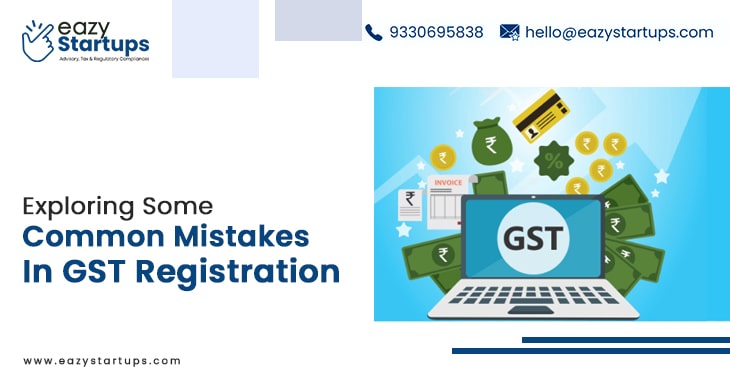Many business owners struggle to navigate the Goods and Services Tax (GST) registration process. It’s easy to get confused by its complex rules and precise requirements. But do not be afraid! Some professionals can help you navigate the complex process of GST Registration. If you need professional help completing your Online GST Registration in India, contact Eazy Startups today.
There is no doubt that Online GST Registration involves a lot of complications, but with the assistance of specialists from Eazy Startups, you can avoid all complications along the path. Thus, you can achieve a hassle-free GST Registration. Contact us today if you need our help. This blog will highlight some common mistakes in GST Registration.
Let’s dive in:-
- Ignoring the Need to Register
- Incorrect Information
- Misunderstanding the Nature of Your Business
- Overlooking State-wise Registration Requirements
- Neglecting to Update Business Details
- DIY-ing Without Sufficient Knowledge
Ignoring the Need to Register:
The first error is to underestimate the significance of the GST Registration process. If your company’s yearly revenue surpasses a certain level, which varies by nation, registration becomes advantageous and required. Ignoring this could result in fines, interest on overdue taxes, and damage to your company’s reputation. Thus, monitor your turnover and ensure you register on time to comply with the law.
Incorrect Information:
It’s important to complete your Online GST Registration form precisely. Entering inaccurate or missing information, whether it’s your bank account information, address, or business name, is a frequent mistake. These mistakes could drag the procedure out or possibly cause your application to be rejected. Before submitting, be sure that every detail is verified twice and that the information corresponds with official records.
Misunderstanding the Nature of Your Business:
GST classifications can be as intricate as a spaghetti dish. Inaccurate tax filings due to misclassifying your products or services under the incorrect tax slab may result in fines or overpayment of taxes. To correctly classify your offerings, delve further into the GST tax slabs and categories or speak with a tax professional.
Overlooking State-wise Registration Requirements:
It is important to remember that if your company conducts business in more than one state, you will require individual GST registrations for each one. This is essential for compliance and proper tax filings. Keep in mind that every state has a different GST environment, so educate yourself on each one’s particulars.
Neglecting to Update Business Details:
Businesses should adapt, and the same goes for GST filings. Compliance problems may arise if your GST profile is not updated to reflect modifications to your company’s contact information, address, or locations of operation. To prevent issues, make sure your social media accounts and GST information are up to date.
DIY-ing Without Sufficient Knowledge:
Do-it-yourself culture makes it alluring to manage GST Registration on your own. But jumping in without a full grasp of GST legislation can be likened to travelling without a map. Tax methods that are not optimal or non-compliant can result from misinterpretations. Never be afraid to use trustworthy materials or consult a GST specialist to expand your understanding.
Concluding Words
Even while GST registration can seem complicated due to its many complexities, it can go more smoothly if you are aware of frequent mistakes. Always keep in mind that creating a strong foundation for your company’s financial stability and compliance is just as important as preventing missteps. You may handle GST registration like an expert by taking your time, carefully reviewing all the information, being aware of your company’s tax responsibilities, and keeping up to date. But if you have difficulties doing it on your own and want professional help completing Online GST Registration in India, reach out to our GST specialists at Eazy Startups today. Visit our website if you want more details.



Recent Comments